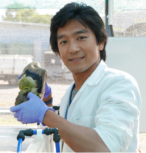DNA reveals the past and future of coral reefs
New DNA techniques are being used to understand how coral reacted to the end of the last ice age in order to better predict how they will cope with current changes to the climate. James Cook Univer

From 2005 to 2022, the main node of the ARC Centre of Excellence for Coral Reef Studies was headquartered at James Cook University in Townsville, Queensland (Australia)








Abstract:
Evolution of many eukaryotic organisms is affected by interactions with microbes. Microbial symbioses can ultimately reflect host’s diet, habitat range, and even body shape. However, how these intimate associations shape over evolutionary time is still elusive. A group of marine oligochaetes have no mouth, gut and excretory systems. Instead, these ‘gutless’ worms are packed with a suite of bacterial symbionts, including sulfate-reducing bacteria, sulfide-oxidizing bacteria and a spirochaete, which in concert provide the host with carbons and recycle host waste products. To better understand the evolutionary dynamics of this multi-partner symbiosis, this work focused on microevolution of the host and its symbionts in populations of the best-studied species, Olavius algarvensis. Metagenomes of hundreds specimens collected from several bays off the Island of Elba, Italy, and Mallorca, Spain, were analyzed based on single nucleotide polymorphisms in host nuclei, host mitochondria, and symbionts. Results showed that O. algarvensis forms reproductively well-isolated populations at a small geographic scale (~5 km), while variable mixtures of mitochondrial lineages co-occur and interbreed within each population. Compositions of symbiont species and intraspecific strains are highly linked to the host mitochondrial lineages, indicating their vertical co-inheritance along mitochondria, with symbiont members undergoing stochastic loss and replacement with symbiont-specific rates. A set of heritable symbiotic consortia unique to each location (i.e., host population) highlights that coevolution between gutless worms and their symbiotic consortia is likely a highly complex and dynamic process. This insight at a fine microevolutionary scale is applicable to evolutionary dynamics of other intimate animal-microbial symbioses.
Bio:
Yui is a postdoctoral fellow in James Cook University, and has joined the force for the Reef Restoration and Adaptation Program. His current work focusses on the effect of coral genetic diversity in the coral aquaculture effort and development of scalable detection methods for coral pathogens and pests using molecular approaches. Yui has completed his PhD in James Cook University on the ecology and microbiology of a coral disease. Following his PhD, he has conducted a postdoc fellowship on a closely related study in AIMS, and held a scientist position at the Max Planck Institute for Marine Microbiology until recently. In the Max Planck Institute, he used population-scale metagenomics to tackle evolutionary questions in animal-bacterial symbioses. The seminar outlines some of the highlight from this work in the MPI.
New DNA techniques are being used to understand how coral reacted to the end of the last ice age in order to better predict how they will cope with current changes to the climate. James Cook Univer
A new study on the effects of climate change in five tropical countries has found fisheries are in more trouble than agriculture, and poor people are in the most danger. Distinguished Profess
James Cook University researchers have found brightly coloured fish are becoming increasingly rare as coral declines, with the phenomenon likely to get worse in the future. Christopher Hemingson, a
Researchers working with stakeholders in the Great Barrier Reef region have come up with ideas on how groups responsible for looking after the reef can operate more effectively when the next bleaching
Abstract: As marine species adapt to climate change, their heat tolerance will likely be under strong selection. Individual variation in heat tolerance and its heritability underpin the potential fo
Abstract: The Reef Ecology Lab in KAUST’s Red Sea Research Center explores many aspects of movement ecology of marine organisms, ranging from adult migrations to intergenerational larval dispersal
Abstract: Macroalgal meadows are a prominent, yet often maligned component of the tropical seascape. Our work at Ningaloo reef in WA demonstrate that canopy forming macroalgae provide habitat for ad
Abstract: Sharks are generally perceived as strong and fearsome animals. With fossils dating back at least 420 million years, sharks are not only majestic top predators but they also outlived dinosa
Abstract: Connectivity plays a vital role in many ecosystems through its effects on fundamental ecological and evolutionary processes. Its consequences for populations and metapopulations have been
Abstract: Evolution of many eukaryotic organisms is affected by interactions with microbes. Microbial symbioses can ultimately reflect host’s diet, habitat range, and even body shape. However, how
Abstract: The past few years have seen unprecedented coral bleaching and mortality on the Great Barrier Reef (GBR) but the consequences of this on biodiversity are not yet known. This talk will expl